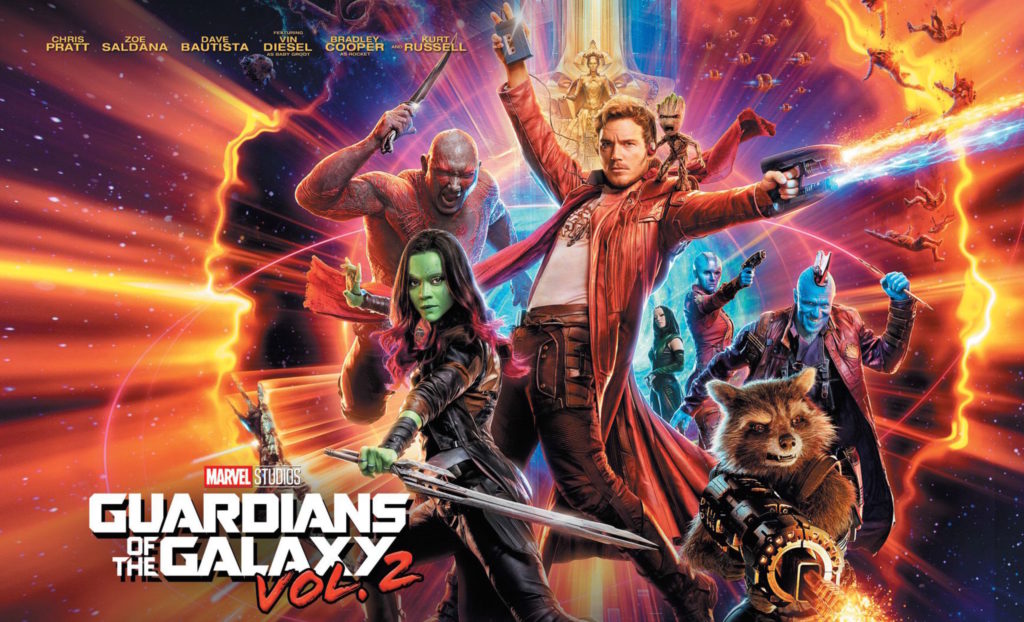Five Ways To Fix The Marvel Cinematic Universe
Guardians of the Galaxy Vol. 2 is the fourth Marvel Cinematic Universe film to be afflicted by a few common story issues. In my mixed review of Vol. 2 today at Christianity Today, I note:
When the [Guardians of the Galaxy Vol. 2] filmmakers show discipline by focusing separately on the crew’s very human griefs, with humor that helps power these struggles, the film blasts off. But moments of uncertainty—especially when the story retreats from its own big ideas in favor of tiny ideas or distracting jokes—threaten to undermine the film’s own fun characters and original ideas.1
I’ve noticed similar issues in all the Marvel films since Ant-Man, I wondered if Marvel might head off these issues with Captain America: Civil War, or even Doctor Strange. But so far they’ve only done more of the same. And the issues are kind of getting worse. But no one seems to want to point these out, lest they come off as nitpickers (or perhaps DC partisans).
Fine. I’ll do it myself.2
1. Raise the story stakes.
 In Guardians of the Galaxy Vol. 2, the crew is swarmed by autopiloted ships from the elitist Sovereign. Not a one is manned (so Rocket can shoot without killing a soul). And not a one poses any real threat to the Guardians’ ship. Even when it crash-lands on the planet, Drax—left dragging behind the ship on a cable—only laughs and bellows, “That was awesome!”
In Guardians of the Galaxy Vol. 2, the crew is swarmed by autopiloted ships from the elitist Sovereign. Not a one is manned (so Rocket can shoot without killing a soul). And not a one poses any real threat to the Guardians’ ship. Even when it crash-lands on the planet, Drax—left dragging behind the ship on a cable—only laughs and bellows, “That was awesome!”
It’s funny, but also typical. All these characters are “super,” and so their only vulnerabilities are emotional. But emotional vulnerabilities resonate more when paired with the risk of actual, physical harm to our heroes. When everyone’s super, no one will be.
Limits and dramatic stakes give the story actual significance. It’s no surprise that the most critically acclaimed Marvel Cinematic Universe film, Captain America: The Winter Soldier, offers the highest no-apology stakes for our heroes. Marvel movies must add more of them, without apology, and without winking to remind us it’s all in good fun because this movie is Fun. For example:
2. Lower the total of distracting jokes.

Doctor Strange (justifiably) hurls villains into hell, then cracks a joke, and nobody panics. Other heroes take lives as a sober duty (and may show personal anguish over the deed), well then everyone loses their minds.
Here is my least favorite moment of Doctor Strange. In the film’s time-bending and rather spectacular finale, Strange defeats the entity Dormammu by locking himself in a magical time-loop and acting out a sort of “Christus victor” salvation. Finally, the entity withdraws from Earth, and all his cultish slaves are drawn screaming into the void after him.
Strange: “It’s everything you ever wanted. Eternal life as part of the One. You’re not going to like it.”
Translating into Christian-ese, Dr. Strange literally defeats the Devil and sends him back to Hell along with his demonic legions. It’s a dramatic, sobering end—
Strange: “I think he really should have stolen the whole book, because the warnings—the warnings come after the spells.”
This is so wrong. It clashes with the scene before, breaks the story “spell,” and may as well show the wires and CG frames holding the sets together. It’s even worse after Strange has earlier honestly confronted the fact that, as a sorcerer, he must break his physicians’ oath and actually kill other human beings. Here he isn’t sober at all. He’s cracking a flippant joke.
Similarly, in Vol. 2, the flippant jokes are doubled. Unlike the first Guardians, many of them don’t actually bounce off the story or add to the characters. They only distract.
Marvel Cinematic Universe films must start cutting back on these. I love humor, but not at the story’s expense.
3. Get your soundtrack musical act together.

I must be the only person who prefers these film soundtracks over the Guardians “awesome mix” music.
It’s probably too late to fix this. But Marvel movies are a musical soundtrack mess. Iron Man had a great rockstar theme (Ramin Djawadi) in his first film. It vanished for the second film. It was replaced in the third film with another killer theme by Brian Tyler, and the theme briefly returns in Avengers: Age of Ultron. But now it’s vanished as if we never heard it.
Same with Thor’s theme. Patrick Doyle made a good one. Tyler enhanced it. Then in Age of Ultron, it’s gone. Marvel must have felt Tyler couldn’t do Ultron by himself.
Captain America’s theme (Alan Silvestri) lasted a few movies. Will Marvel also tire of it?
I’m tired of really coming to love these heroic themes, and then having them disposed along with their original composers. Whatever it takes, I want Marvel to pay for continuing to use these themes even after their composers depart. (This is easy enough for parent company Disney to do with the Star Wars themes.) Add some heroic music consistency for a change.
4. Make room for smaller stories, like Ant-Man.
 Ant-Man is underappreciated, and I think a lot of people recognize this. Sure, it follows the formula of Iron Man: Jerk with a heart of gold gets a chance at real heroism, thanks to a technologically advanced suit, then fights an evil villain who makes similar technology. But Ant-Man offered a refreshing turn from Captain America: Civil War, which gave us all but two heroes in one movie and incidentally neglected the need to focus on a central hero.
Ant-Man is underappreciated, and I think a lot of people recognize this. Sure, it follows the formula of Iron Man: Jerk with a heart of gold gets a chance at real heroism, thanks to a technologically advanced suit, then fights an evil villain who makes similar technology. But Ant-Man offered a refreshing turn from Captain America: Civil War, which gave us all but two heroes in one movie and incidentally neglected the need to focus on a central hero.
I’m as big a fan of ensemble-cast Marvel movies as anyone. But even those new characters must take a backseat to the one figure whose name is in the movie title (Captain America). Otherwise you do risk adding too much character “candy” to every story (see no. 8 below).
5. Take a character’s death a little more seriously.
 Vol. 2 never presents any real threat to the Guardians themselves. And that’s not just in the usual “heroes never actually lose, so the real tension is how they win” way. Similarly, in Captain America: Civil War, despite all the fan theories about characters dying, no one died at all. Not Steve Rogers. Not even Rhodey, who takes a beating but suffers no lasting harm.
Vol. 2 never presents any real threat to the Guardians themselves. And that’s not just in the usual “heroes never actually lose, so the real tension is how they win” way. Similarly, in Captain America: Civil War, despite all the fan theories about characters dying, no one died at all. Not Steve Rogers. Not even Rhodey, who takes a beating but suffers no lasting harm.
And while it was fun to see Agent Coulson return to TV after his death in The Avengers, I understand Joss Whedon’s reluctance to admit Marvel had undone Coulson’s serious-making death that galvanizes the team. I may also see why Whedon, who was also unfairly condemned for Age of Ultron’s few missteps, ended up going to the DCEU for a try at Batgirl, which will likely share Whedon’s love for female heroes and surprising, significant deaths).
In Marvel Cinematic Universe films, permanent death is an exception, not the rule. This needs to stop, or else we can’t take the Marvel films even somewhat seriously.
And no, the stories don’t need to kill a person we’ve come to love (though this might help, and not just by killing someone we’ve only known as a side character for one or two films). Instead, let us feel actual threat to our heroes. Oddly enough, the earliest Marvel films, Iron Man and The Incredible Hulk, showed greater commitment to actual high stakes. You feel Tony’s in danger in Afghanistan. You feel Bruce Banner could suffer in Brazil. But even later in The Avengers, non-super-heroes Black Widow and Hawkeye are seen in moments of real fear and pain at their situation. And the story doesn’t want to laugh at them.
Thursday: Five More Ways to Fix the Marvel Cinematic Universe.
- See also Zachary Totah’s more-positive review of Guardians of the Galaxy Vol. 2. I share some of his positive take, and yet mostly agree with Keven Newsome’s more-negative review. ↩
- And at risk of spoiling several Marvel Cinematic Universe films, especially Guardians of the Galaxy and GOTG Vol. 2, Doctor Strange, Captain America: Civil War, Ant-Man and Avengers: Age of Ultron. ↩










































I enjoyed the film, but it was definitely a notch below the original – in other words, I consider it a fairly solid, but typical, sequel.
—spoiler alert just in case—
I agree the jokes felt just a bit off-kilter, mostly from being less tied into the flow of story and action. The thing that really triggered my thinking about it, though, was the one point where a joke was *not* made. In the final confrontation in the first film, the big dramatic fight scene is suddenly broken by Starlord invoking a dance-off. It looks stupid and silly, but it turns out to have been the distraction that allows the Guardians to pull their winning move. I was very much expecting something similar in Volume 2, especially since the final showdown was a similar extravaganza of SFX and interaction. Of all places, this is where Starlord should have pulled something completely out of the box, but instead it came down to just another “I think I can, I think I can” where the hero wins by force of will rather than the wild cleverness that is – or should be – his trademark.
I wholeheartedly agree with your fourth point. I find refuge in the TV/Netflix Marvel series, which have indeed been focusing on smaller stories, less cosmic heroes, and more interactions with everyday people and a more down-to-earth world (no pun intended, but I’ll take it).
And to be honest, I couldn’t help but crack a smile at the fifth point. Character death in superhero comics is practically a joke (to comics fans, at least); many superheroes have died “permanently” only to reappear some time later with a hand-waving explanation. The idea of permanent death is very much swimming upstream against the source material, and given Hollywood’s predilection for happy endings, I doubt we’ll see it on the big screen, at least until the actors get far too old and/or tired of their assigned roles (and even then, given actor replacement technology, that’s an open question).
Looking forward to Volume 2 of your list…
Hi Tim,
Totally agree on that last point. I recall that there used to be a saying that the only permanent deaths in comics are Uncle Ben, Jason Todd and Bucky…and even THAT’s not true anymore. That’s actually part of what drove me to indie comics for a while.
I haven’t watched the Marvel movies for a while now, but it sounds like they’re suffering the same problem that superhero comics in general suffer from…cheap, reversible deaths.